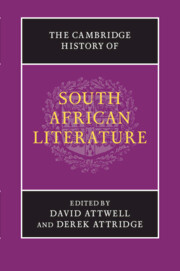Book contents
- Frontmatter
- Introduction
- PART I ORATURES, ORAL HISTORIES, ORIGINS
- PART II EXPLORATION, EARLY MODERNITY AND ENLIGHTENMENT AT THE CAPE, 1488–1820
- PART III EMPIRE, RESISTANCE AND NATIONAL BEGINNINGS, 1820–1910
- PART IV MODERNISM AND TRANSNATIONAL CULTURE, 1910–1948
- PART V APARTHEID AND ITS AFTERMATH, 1948 TO THE PRESENT
- PART VI SOUTH AFRICAN LITERATURE: CONTINUITIES AND CONTRASTS
- 33 South Africa in the global imaginary
- 34 Confession and autobiography
- 35 ‘A change of tongue’: questions of translation
- 36 Writing women
- 37 The experimental line in fiction
- 38 The book in South Africa
- 39 Literary and cultural criticism in South Africa
- Index
- References
36 - Writing women
from PART VI - SOUTH AFRICAN LITERATURE: CONTINUITIES AND CONTRASTS
Published online by Cambridge University Press: 28 January 2012
- Frontmatter
- Introduction
- PART I ORATURES, ORAL HISTORIES, ORIGINS
- PART II EXPLORATION, EARLY MODERNITY AND ENLIGHTENMENT AT THE CAPE, 1488–1820
- PART III EMPIRE, RESISTANCE AND NATIONAL BEGINNINGS, 1820–1910
- PART IV MODERNISM AND TRANSNATIONAL CULTURE, 1910–1948
- PART V APARTHEID AND ITS AFTERMATH, 1948 TO THE PRESENT
- PART VI SOUTH AFRICAN LITERATURE: CONTINUITIES AND CONTRASTS
- 33 South Africa in the global imaginary
- 34 Confession and autobiography
- 35 ‘A change of tongue’: questions of translation
- 36 Writing women
- 37 The experimental line in fiction
- 38 The book in South Africa
- 39 Literary and cultural criticism in South Africa
- Index
- References
Summary
Women's writing spans the periods, concerns, genres, languages and media addressed in this collection. The purpose of this chapter is not so much to provide a detailed overview of women's writing in South Africa – an impossible task within the space constraints – as to sketch out landmark publications, attending to the emergence of the female autograph and the ways in which women write women within and/or against feminist and national discourses, while exploring the following questions: Through what devices, tropes and reconstructed genealogies have women writers laid claim to artistry, authorship and textual authority? How do they represent the category of ‘women’ and inscribe national identity within a fractured, divided and heterogeneous polity? What representational strategies do they develop to unpick the ‘patchwork quilt of patriarchies’ (Bozzoli, ‘Marxism’, pp. 149, 155) in South Africa?
The female autograph and the nation: Schreiner and Mgqwetho
Situated on opposite sides of the colonial divide, taking up different generic approaches and grappling with divergent concerns, Olive Schreiner (1855–1920) and Nontsizi Mgqwetho (published during the 1920s; date of birth and death unknown) enter into print culture an emergent national and feminist consciousness, while negotiating female authorship. The fate of their respective oeuvres is indicative of the differential challenges women have faced in coming into and remaining in print in South Africa. Schreiner's first novel, The Story of an African Farm (1883), was an immediate success and has achieved canonical status, yet it was first published under a male pseudonym (Ralph Iron).
- Type
- Chapter
- Information
- The Cambridge History of South African Literature , pp. 757 - 778Publisher: Cambridge University PressPrint publication year: 2012
References
- 1
- Cited by



